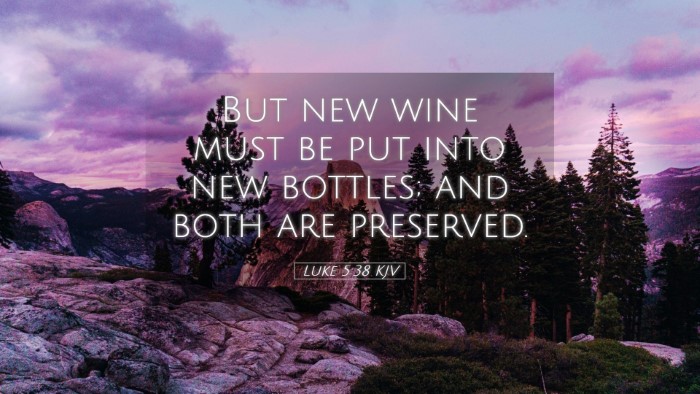Commentary on Luke 5:38
Luke 5:38 states: "But new wine must be put into new bottles; and both are preserved." This verse has profound implications for understanding the nature of Christ’s ministry and the transformative power of the gospel. Below we explore insights from various public domain commentators to unpack the significance of this teaching.
Contextual Background
The context of this verse is essential for interpretation. Jesus is addressing the Pharisees and their disciples who question why His followers do not fast like the disciples of John the Baptist. This leads to a discourse on the nature of His ministry, signifying a departure from the old traditions (represented by the old wine and old bottles) into something new and everlasting (the new wine).
Interpretation of the Verse
The phrase "new wine" represents the gospel message—the new covenant that Christ brings. Christ Himself is the embodiment of this newness. Matthew Henry reflects on the radical change that the gospel brings, emphasizing that it cannot be contained within the old traditions that were no longer sufficient for salvation.
Insights from Commentators
-
Matthew Henry's Perspective
Matthew Henry asserts that the new wine signifies the grace and doctrines of the gospel, highlighting that these cannot coexist with the old legalistic practices. He mentions that just as old wine requires old bottles that can accommodate its properties, the gospel requires new structures and understandings for its preservation and expression.
-
Albert Barnes' Interpretation
Albert Barnes elaborates on the metaphor of bottles, or wineskins, explaining that they are made to stretch and adapt to the fermentation process of wine. He suggests that the new teachings of Jesus necessitate a new framework, as the old religious systems cannot contain the spontaneous nature of the gospel.
-
Adam Clarke's Exegesis
Adam Clarke emphasizes the point that both the new bottle and the new wine must exist in a harmonious relationship. He discusses the danger of mixing the old and the new, indicating that when the gospel is poured into old religious systems, it risks both the wine and the container being lost. Clarke reiterates that the existential force of the gospel calls for a reconsideration of religious identities and practices.
Theological Implications
Understanding that new wine must be placed in new bottles presents several theological implications:
- Transformational Nature of the Gospel: The gospel transforms individuals and communities. It signifies a break from the past and emphasizes the need for renewal in heart and spirit.
- Adaptability of Faith: The faith we embrace must be flexible enough to accommodate the new revelations and workings of the Holy Spirit, allowing believers to grow and adapt.
- Rejection of Legalism: This verse challenges the structures that bind believers to legalistic practices which may hinder spiritual growth and the fullness of God's grace.
Conclusion
Luke 5:38 serves as a critical reminder of the importance of receptivity to change and the transformative impact of the gospel. As leaders, scholars, and students of Scripture, we are called to embrace the newness of Christ’s message while ensuring that our frameworks for understanding and practice are aligned with His teachings. The richness of this metaphor encourages a continual examination of our traditions in light of the dynamism of God's revelation.


